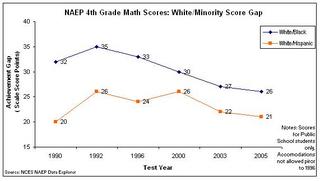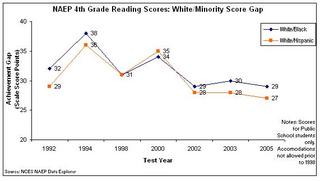Who Needs Science Anyway?
Friday, October 28, 2005
According to this
new standoff between the Kansas school board and the Nat'l Academy of Sciences and Nat'l Science Teachers Association, students in Kansas may be sitting in science class without any science materials.
NAEP 4th Grade Data Trends, by Race
Wednesday, October 19, 2005
(NB: the Y-axis scale is different on each of these graphs, in order to maximize their readability)




So... looking at the NAEP score trends by race, the statement that achievement gaps are closing "particularly in the 4th grade" doesn't seem true.
The only gap change that might be statistically significant from 1990-2005 is the White/Black Math gap, at 6 points down. In Reading, the gaps are down 2 to 3 points from the first NAEP, after an INCREASE in the gap in the mid-90s. My guess is that 2 or 3 points isn't statistically different. And even if it were statistically, it's not substantively.
Also, there's a lot of footnoting in the NAEP data about how testing accomodations weren't allowed in the early test administrations. I take this to mean that there were some non-English speakers and students with disabilities tested without regard to their limitations in NAEP's early years, which should have lead to actual achievement being underreported. Knowing what we do about Special Ed and LEP populations, this should have disproportionally dragged down Black student scores on the SpEd end and Hispanic student scores in terms of LEP. We can't know how much, but it does make me question whether the "improvements" you see in the scores over time are due to an incresease in their collective knowledge or a change in the rules of the game.
My theory that the people writing the sound bites were looking at overall trends doesn't pan out--I wonder where those statements come from?
Spinning again, Spinning...
Over on
EdWahoo, a look at Bush Administration sound bites RE: today's new NAEP scores.
I agree that the Bush and Spellings quotes indicate a significant 2003-05 change where there isn't one, but really, the statements (as presented there-- I don't know what the greater context is) are ones of intentional vagueness not complete untruth. As EdWahoo points out, the 03-05 changes aren't significant, but if you take a longer view, 4th grade math scores have been trending up since NAEP started--they're up
25 points from 1990 to 2005. In the snazzy published tables, I couldn't find a trend line by race, so there's no quick way to look at what's happening to the Black/White achievement gap across more than 2 time points. In the next couple of days, I'll play around with the data cutting tool and see if I can't pull something together.
EdWahoo also says the following:
One wouldn't think you could find a way to declare victory when fourth-grade reading scores have improved by one point since the implementation of a landmark education law, but I continue to be amazed.
But, in addition to the non-significant "change" in the past 2 years, there's another substantive problem at work here: you really shouldn't attribute 2005 NAEP scores to NCLB in the first place.
From an evaluation standpoint, you can't expect to see marked test score changes immediately after an intervention. Especially since the last two years haven't exactly represented a smooth or complete implementation of the law. It would be unfair and unrealistic to expect NCLB to produce increases outpacing the general NAEP trends in such a short time, just as it would be misguided to attribute improvements (if there were any) to the law. If correlation doesn't equal causation, coincidence certainly doesn't.
It amuses me that we're trying to attribute non-changes to a law that hasn't had time to work. Thanks for the clarity, guys.
Deep Thoughts About School Choice-An International Perspective
An Education Next
article dispels some school choice myths
about private education and finds lessons learned applicable to U.S. education policy by an assessment of schools in poor communities in India,Ghana, China, and Kenya. The study concludes:
Evidence from developing countries might challenge the claim, made by school choice opponenets, that the poor in America cannot make sensible and informed choices if school choice is offered to them. It may also stimulate the debate about whether public intervention crowds out private initiative...
it's worth reading...
More Value-Added Assessment
Monday, October 17, 2005
Eduwonk points to fellow Education Sector-ite Thomas Toch's article on value-added assessment in this issue of
Washington Monthly.
Again, it's a newish approach that does have its detractors (though little is mentioned of them in this article). Yet, value-added assessment is an interesting concept that I'm sure won't be going away any time soon.
TFA Goes Supersize
Saturday, October 15, 2005
Teach for America just landed
$30 million for capacity building
Wendy Kopp, founder of TFA, explains her vision:
We aim to increase our impact exponentially in the next five years. Meeting our goals will mean that by 2010, we will reach 700,000 students, advancing their academic achievement on average one and a half years ina single year's time. At that point, we will be the top employer of top recent graduates, thus building an unprecendeted pipeline for education leadership...regardless of your opinion of TFA, you have to admit, that's pretty damn impressive
A Study to Watch...
Stanford's Educational Leadership Institute is performing a three year study, which began in Fall 2004, to analyze principal preparation programs and then to "create scalable models" to introduce more effective school leaders into the education environment.
See
here for study overview and review of current research in this topic...
Finding Inspiration from James Loewen (and a little love from RFK)
Today I attended a lecture given by sociologist James Loewen, author of
Lies My Teacher Told Me, about his new book,
Sundown Towns. ("Sundown towns" were towns where white people banned African-Americans from taking residence, thereby creating "whites only" communities, resulting in extreme racial exclusion throughout the country.)
What I found the most interesting was his take on why certain towns DID NOT become "sundown towns". He said that all it took was for
one person to stand up and oppose the banning of blacks to live in their community, for the ordinance or motion to be eradicated.
His point immediately reminded me of my old job where RFK's "ripple" quote was used regularly:
Each time a man stands up for an ideal,...or strikes out against injustice, he sends forth a tiny ripple of hope, and crossing each other from a million different centers of energy and daring those ripples build a current which can sweep down the mightiest walls of oppression and resistance.Loewen and RFK's ideas are relevant to policy work in education. Even though working in policy can be daunting, frustrating, and slowmoving to the point where you feel like nothing will ever change, these two men reminded me of what is important...
Change really does just take one person; to stand up against injustice, to refuse to accept the status quo, and to send out a "ripple of hope". And if we daily strive to be that 'one person', in the end, change in education will be inevitable.
Thanks James Loewen
In the Minority
Sunday, October 09, 2005
A couple of weeks ago, at one of my tables, (besides being a grad student and occasional blogger, I am also a waitress), I had a family of four, where the father asked me if I actually
believed in evolution.
I replied, “Of course I do”. He looked at me in disbelief and said,
“
Well Emily, if you believe in so-called "evolution", then how can you explain who put intelligence in us?”
While I walked away thinking that evolution had forgotten to “put intelligence” in him, I was struck by his complete conviction (even after telling him my 10th grade biology class explanation on Darwin) that a supreme being was behind the creation of humans.
Weeks later, still thinking about it, I decided to read up on the evolution debate…
and apparently, I may be the crazy one…
-------------------------------------------------------------------------------
These days, around 40 states are taking steps to teaching alternatives to evolution. Intelligent design is in the running for the alternative theory du jour (for background on the debate see
here.) According to CNN, 65% of the public favor teaching creationism, 37% want creationism taught instead of evolution, and 55% believe God created humans in their present form (see
here)
A Gallup poll found that only 48% believe that humans evolved over time, but 18% of them believe that it was guided by some supreme being for the purpose of creating life as we know it today. While college grads are more in line with accepting evolution (66%), 14% of students with a high school degree or less, just don’t know what to think.
------------------------------------------------------------------------
After finding the above stats, and doing some more research, there are three issues I have with this debate:
1) The Teachings: I find it odd that since most of us learned Darwin's evolution theory in school that a majority of the public is not in agreement about it. This begs the questions; how are we teaching evolution to our students and how are we, as a community, creating space for diaglogues about religion and how it can coexist with evolution.
2) Education Policy Groups: some of these groups are giving Intelligent Design (ID) clout and allowing it to be on equal playing field with the theory of evolution. AEI is putting on a
conference discussing whether ID should be taught in schools. Meanwhile, ID has not even come close to a scientific theory, let alone should be debated about actually being taught. Even the leaders of the ID movement are stating that it is not ready for teaching. Giving ID theory space and time to discuss its role in public education seems ahead of the game and confusing to the public who are not informed enough to make a educated decision.
3) The Press: media is treating this coverage similar to a debate on abortion or gay rights. This is incorrect to think they are alike. Abortion and gay rights, are based on values and societal contexts. The ID vs. evolution debate is not similar. Evolution is a scientifically founded theory where intelligent design is not. It shouldn’t even be a question. Therefore, the media shouldn’t be “kindling the flames” of the public by writing articles which give a lot of space to explaining Intelligent Design and not explaining scientific facts when defending evolution.
-------------------------------------------------------------------------------
Hopefully, in the next couple of weeks, the courts will quelch this fire by declaring these cases in violation between separation of church and state, and therefore ending this debate for the time being...
Until then, this waitress will continue to engage in the evolution debate at her tables in Georgetown.
![]()
![]() ::
::






